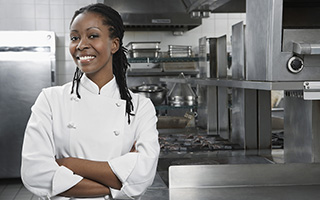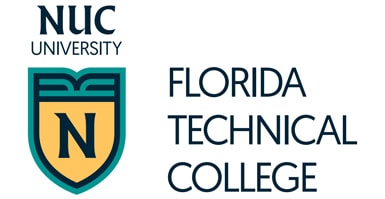Culinary Schools & Colleges
Culinary schools provide many aspiring chefs with the knowledge and abilities to start working in commercial kitchens. You can learn to cook and perform other professional tasks in two years or less. Tens of thousands of jobs are available every year in a wide variety of exciting workplaces.
Culinary Education & Training
Culinary schools specialize in teaching people like you a wide range of valuable skills. Formal training can provide a great head start, regardless of the career path you have in mind. Plus, it can be exciting, challenging, and fulfilling.
Culinary Schools
Sponsored Listings
What You Will Learn in a Culinary Program
 Examples of career-related culinary classes include:
Examples of career-related culinary classes include:
- Safety and sanitation
- Food storage and refrigeration
- Food science
- Mise en place
- Baking and pastry fundamentals
- Classic and regional cuisine
- Food presentation
- Kitchen supervision
- Knife skills and other practical practice
For associate and bachelor's degree programs, general education classes may include subjects such as business, restaurant management, communication, chemistry, and sustainable food practices.
Many programs also include a real-world externship that lets you gain experience in a commercial kitchen before graduating. Some schools even have on-site kitchens and restaurants with paying customers.
Most Common Culinary Education Levels
Future chefs typically only need a high school diploma and practical work experience to get started in the field. However, formal culinary training can be valuable for gaining advanced skills and preparing for advancement in the field. Post-secondary education provides professional training and foundational knowledge and opens doors to mentorships and networking opportunities. While not required, formal culinary education can be a significant advantage for those looking to excel in the industry.
Post-secondary culinary training usually leads to one of these academic credentials:
Certificate or diploma: A certificate or diploma program often takes between 6 and 12 months. It covers basic skills and fundamental knowledge, and the courses are strictly career-related.
Associate degree: Most of your courses will be related to the culinary industry. But you will also have more advanced courses and a few general education classes. Completing a program at this level typically takes from 15 to 24 months.
Certification
Certification is voluntary and is not required to be a chef. However, being professionally certified by a respected organization can give you added credibility in the job market.
Popular options for getting certified include:
- The American Culinary Federation (ACF): This organization offers multiple certification levels for savory cooking and pastry, and one certification for culinary educators.
- ServSafe: The National Restaurant Association offers a variety of certifications related to safely handling food and alcohol.
How Long is Culinary School?
Most commonly, it takes between 15 and 24 months to get through culinary school. However, depending on the school and the academic credential(s) you're seeking, it's possible to find programs that take as little as six months.
Culinary Career Information
Chefs and other culinary professionals are part of a large, important, and highly varied industry. The culinary career sector can offer opportunities and rewards for those with talent, dedication, and enthusiasm.
How Much Does a Chef Make?
- Median yearly pay: $58,920*
- Highest yearly pay: $93,900 or more*
Job Openings & Outlook in the Culinary Field
From 2023 to 2033, the number of new jobs for chefs and head cooks is expected to increase by 8 percent.* That's much faster than the overall occupational average.
Culinary Careers
 Culinary training is designed to prepare you for working within the brigade de cuisine system, a staff hierarchy used in many commercial kitchens. Most people begin their culinary careers in entry-level roles and work their way up through the system. For instance, you might start as a cook and get promoted to more advanced positions as you gain experience.
Culinary training is designed to prepare you for working within the brigade de cuisine system, a staff hierarchy used in many commercial kitchens. Most people begin their culinary careers in entry-level roles and work their way up through the system. For instance, you might start as a cook and get promoted to more advanced positions as you gain experience.
Some of the most common jobs include:
Executive chef: This person is the head manager for food preparation and sometimes oversees more than one restaurant. In many cases, executive chefs do little, if any, cooking.
Chef de cuisine: Also known as the head chef (or, in some restaurants, the executive chef), this culinary pro manages the entire kitchen. Some head chefs help cook or expedite food regularly.
Sous chef: This person is often the second in command. They generally run the kitchen daily and are very involved in the food preparation.
Saucier: This position focuses on making sauces, preparing warm appetizers, and finishing various dishes.
Station chef: Also known as a chef de partie, this person manages a particular station (i.e., an area of the kitchen) and prepares specific types of dishes.
Commis: This junior chef rotates between various stations, filling in as needed.
Line cook: In this role, the focus tends to be on preparing one type of food in a specific way at a single station.
Garde manger: This person prepares cold salads, sandwiches, and appetizers.
Pastry chef: Prepare desserts and baked items. Also known as a pâtissier, you can even specialize in a particular type of item, such as bread, cake, candy, frozen dessert, breakfast pastry, or chocolate.
Other culinary careers: Some culinary professionals enjoy focusing their careers in a particular area. For example, you can specialize as a personal chef, caterer, research chef, or culinary teacher.
Is a Chef Career Right for You?
 To be a chef, you should have a real passion for making great food. That's the biggest thing. (One way to learn whether you truly have enthusiasm for the industry is to work in a commercial kitchen first, even if it's just doing dishes or basic prep work.) But it's also good to agree with the following statements:
To be a chef, you should have a real passion for making great food. That's the biggest thing. (One way to learn whether you truly have enthusiasm for the industry is to work in a commercial kitchen first, even if it's just doing dishes or basic prep work.) But it's also good to agree with the following statements:
- You want a career that falls outside of the typical nine-to-five routine.
- You are willing to work up the ranks within a commercial kitchen.
- You can handle being on your feet for long periods.
- You work well under pressure.
- A team environment appeals to you.
- You have an exceptional eye for detail.
- You take direction well.
Check Out Local Programs If You Want to Go to Culinary School
Many cities across the U.S. have culinary schools that offer convenient training options. In most cases, they provide lots of hands-on instruction so that you can hit the ground running when you begin your career in a commercial kitchen.
* Bureau of Labor Statistics, U.S. Department of Labor, Occupational Outlook Handbook. Some careers listed may be part of a combined occupation profile (visited November 4, 2024).



